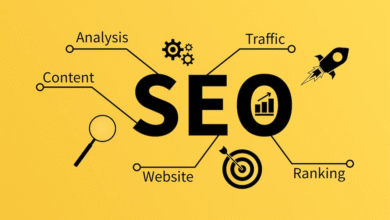How Location Data Is Changing Digital Strategy

Introduction: The Rise of Location Intelligence
In today’s digitally connected world, location data has evolved from a niche tool into a critical component of modern digital strategy. Businesses are no longer just competing for attention—they’re competing for relevance, and nothing drives relevance like proximity. By understanding where users are and how location affects their behavior, brands can craft marketing strategies that are more timely, personalized, and effective. This shift has unlocked a new frontier of data-driven decision-making, allowing companies to reach the right people in the right place at the right time. As technology advances, location-based insights are becoming central to any brand’s competitive edge.
From Static Data to Dynamic Targeting
Traditional marketing once relied on broad demographics and general behaviors, but location data introduces a dynamic layer of context. With GPS-enabled devices, Wi-Fi triangulation, and location-tagged content, marketers now have access to real-time data about where their audiences are physically located. This shift allows for hyper-targeted campaigns, where ads and content are tailored not only to the user’s profile but also to their immediate environment. For example, a retail brand can deliver a promotion to a customer walking near a store or recommend products based on local weather conditions. The ability to combine intent with place transforms how businesses approach customer engagement.
Enhancing Customer Experience with Personalization
Location data plays a key role in creating seamless, personalized experiences across digital and physical touchpoints. Brands that leverage this data can customize everything from mobile app interfaces to email content based on regional preferences or local events. For instance, a food delivery service can adjust its homepage to show trending items in a user’s city, or a fitness brand can tailor content around local parks and running trails. These subtle yet impactful adjustments demonstrate an understanding of customer context, deepening loyalty and satisfaction. When executed thoughtfully, this kind of personalization doesn’t feel like marketing—it feels like relevance.
The Role of AI in Location-Based Strategy
Artificial intelligence is a powerful ally in making sense of the vast amount of location data being generated. AI can analyze patterns in movement, behavior, and timing to help marketers predict future actions. For example, machine learning models can determine when a customer is most likely to visit a store based on historical data and send timely reminders or discounts. This is where ai seo services are beginning to redefine traditional search engine optimization. By integrating location intelligence with AI-powered insights, SEO strategies become more nuanced—accounting for regional search trends, local search behaviors, and even seasonal fluctuations across different geographies.
Strengthening Local SEO with Geotargeting
Location data is especially valuable for businesses that depend on local traffic, such as restaurants, service providers, and retail stores. Local SEO has long been a cornerstone of visibility in maps and search, but the addition of AI and real-time geotargeting takes it to a new level. Businesses can now adjust their content and advertising based on local events, competitor movements, or shifting customer habits. For example, a clinic might highlight cold and flu treatments more prominently during a regional outbreak, or a car dealership could promote all-wheel-drive vehicles during an incoming snowstorm. By tapping into ai seo services, companies can keep their local digital presence sharp and adaptive.
Real-World Examples of Impact
The practical applications of location data in digital strategy are both diverse and impressive. A global quick-service restaurant chain used location insights to redesign its delivery zones, increasing order efficiency and reducing wait times. Meanwhile, an apparel brand leveraged heat maps of foot traffic in malls to optimize store placement, resulting in higher revenue per square foot. Even in the realm of tourism, travel companies use predictive location modeling to suggest destinations based on past trips and seasonal trends. In each case, location data wasn’t just a support feature—it was the strategic foundation that drove growth and performance.
Challenges and Ethical Considerations
While the benefits of location data are clear, they come with ethical responsibilities. Consumers are increasingly aware of how their data is being used and expect transparency in exchange for personalization. Companies must ensure they’re collecting data with proper consent, storing it securely, and using it in ways that genuinely benefit the user experience. Moreover, over-targeting or intrusive messaging can backfire if not managed carefully. Balancing personalization with privacy is essential, and businesses that navigate this balance well will build trust while still reaping the rewards of advanced location intelligence and ai seo services.
In Conclusion
Location data is no longer an optional layer in digital strategy—it’s a driving force behind meaningful, contextual customer engagement. As more consumers adopt mobile-first behaviors and expect real-time interactions, businesses that incorporate location intelligence will stay ahead of the curve. When paired with tools like ai seo services, the impact of this data becomes exponential, enabling brands to not only respond to current trends but anticipate them. The future of digital marketing will be defined by relevance, and nothing provides relevance like knowing where your customer is and what they need at that moment. Now is the time to make location strategy a central part of your digital playbook.
Introduction: The Rise of Location Intelligence
In today’s digitally connected world, location data has evolved from a niche tool into a critical component of modern digital strategy. Businesses are no longer just competing for attention—they’re competing for relevance, and nothing drives relevance like proximity. By understanding where users are and how location affects their behavior, brands can craft marketing strategies that are more timely, personalized, and effective. This shift has unlocked a new frontier of data-driven decision-making, allowing companies to reach the right people in the right place at the right time. As technology advances, location-based insights are becoming central to any brand’s competitive edge.
From Static Data to Dynamic Targeting
Traditional marketing once relied on broad demographics and general behaviors, but location data introduces a dynamic layer of context. With GPS-enabled devices, Wi-Fi triangulation, and location-tagged content, marketers now have access to real-time data about where their audiences are physically located. This shift allows for hyper-targeted campaigns, where ads and content are tailored not only to the user’s profile but also to their immediate environment. For example, a retail brand can deliver a promotion to a customer walking near a store or recommend products based on local weather conditions. The ability to combine intent with place transforms how businesses approach customer engagement.
Enhancing Customer Experience with Personalization
Location data plays a key role in creating seamless, personalized experiences across digital and physical touchpoints. Brands that leverage this data can customize everything from mobile app interfaces to email content based on regional preferences or local events. For instance, a food delivery service can adjust its homepage to show trending items in a user’s city, or a fitness brand can tailor content around local parks and running trails. These subtle yet impactful adjustments demonstrate an understanding of customer context, deepening loyalty and satisfaction. When executed thoughtfully, this kind of personalization doesn’t feel like marketing—it feels like relevance.
The Role of AI in Location-Based Strategy
Artificial intelligence is a powerful ally in making sense of the vast amount of location data being generated. AI can analyze patterns in movement, behavior, and timing to help marketers predict future actions. For example, machine learning models can determine when a customer is most likely to visit a store based on historical data and send timely reminders or discounts. This is where ai seo services are beginning to redefine traditional search engine optimization. By integrating location intelligence with AI-powered insights, SEO strategies become more nuanced—accounting for regional search trends, local search behaviors, and even seasonal fluctuations across different geographies.
Strengthening Local SEO with Geotargeting
Location data is especially valuable for businesses that depend on local traffic, such as restaurants, service providers, and retail stores. Local SEO has long been a cornerstone of visibility in maps and search, but the addition of AI and real-time geotargeting takes it to a new level. Businesses can now adjust their content and advertising based on local events, competitor movements, or shifting customer habits. For example, a clinic might highlight cold and flu treatments more prominently during a regional outbreak, or a car dealership could promote all-wheel-drive vehicles during an incoming snowstorm. By tapping into ai seo services, companies can keep their local digital presence sharp and adaptive.
Real-World Examples of Impact
The practical applications of location data in digital strategy are both diverse and impressive. A global quick-service restaurant chain used location insights to redesign its delivery zones, increasing order efficiency and reducing wait times. Meanwhile, an apparel brand leveraged heat maps of foot traffic in malls to optimize store placement, resulting in higher revenue per square foot. Even in the realm of tourism, travel companies use predictive location modeling to suggest destinations based on past trips and seasonal trends. In each case, location data wasn’t just a support feature—it was the strategic foundation that drove growth and performance.
Challenges and Ethical Considerations
While the benefits of location data are clear, they come with ethical responsibilities. Consumers are increasingly aware of how their data is being used and expect transparency in exchange for personalization. Companies must ensure they’re collecting data with proper consent, storing it securely, and using it in ways that genuinely benefit the user experience. Moreover, over-targeting or intrusive messaging can backfire if not managed carefully. Balancing personalization with privacy is essential, and businesses that navigate this balance well will build trust while still reaping the rewards of advanced location intelligence and ai seo services.
In Conclusion
Location data is no longer an optional layer in digital strategy—it’s a driving force behind meaningful, contextual customer engagement. As more consumers adopt mobile-first behaviors and expect real-time interactions, businesses that incorporate location intelligence will stay ahead of the curve. When paired with tools like ai seo services, the impact of this data becomes exponential, enabling brands to not only respond to current trends but anticipate them. The future of digital marketing will be defined by relevance, and nothing provides relevance like knowing where your customer is and what they need at that moment. Now is the time to make location strategy a central part of your digital playbook.



